Business Law: Valid Contract Formation Based on Principles of Contract Law
VerifiedAdded on 2023/06/15
|5
|1751
|265
AI Summary
This article explores the principles of contract law to determine if a valid contract has been formed between SuperNatural and Gaia. It discusses the elements of offer, acceptance, and intention to create legal obligation. The article applies the principles established in landmark cases such as Carlill v Carbolic Smoke Ball Company and Smith v Hughes to analyze the situation. The conclusion is that Gaia has a valid claim against SuperNatural.
Contribute Materials
Your contribution can guide someone’s learning journey. Share your
documents today.
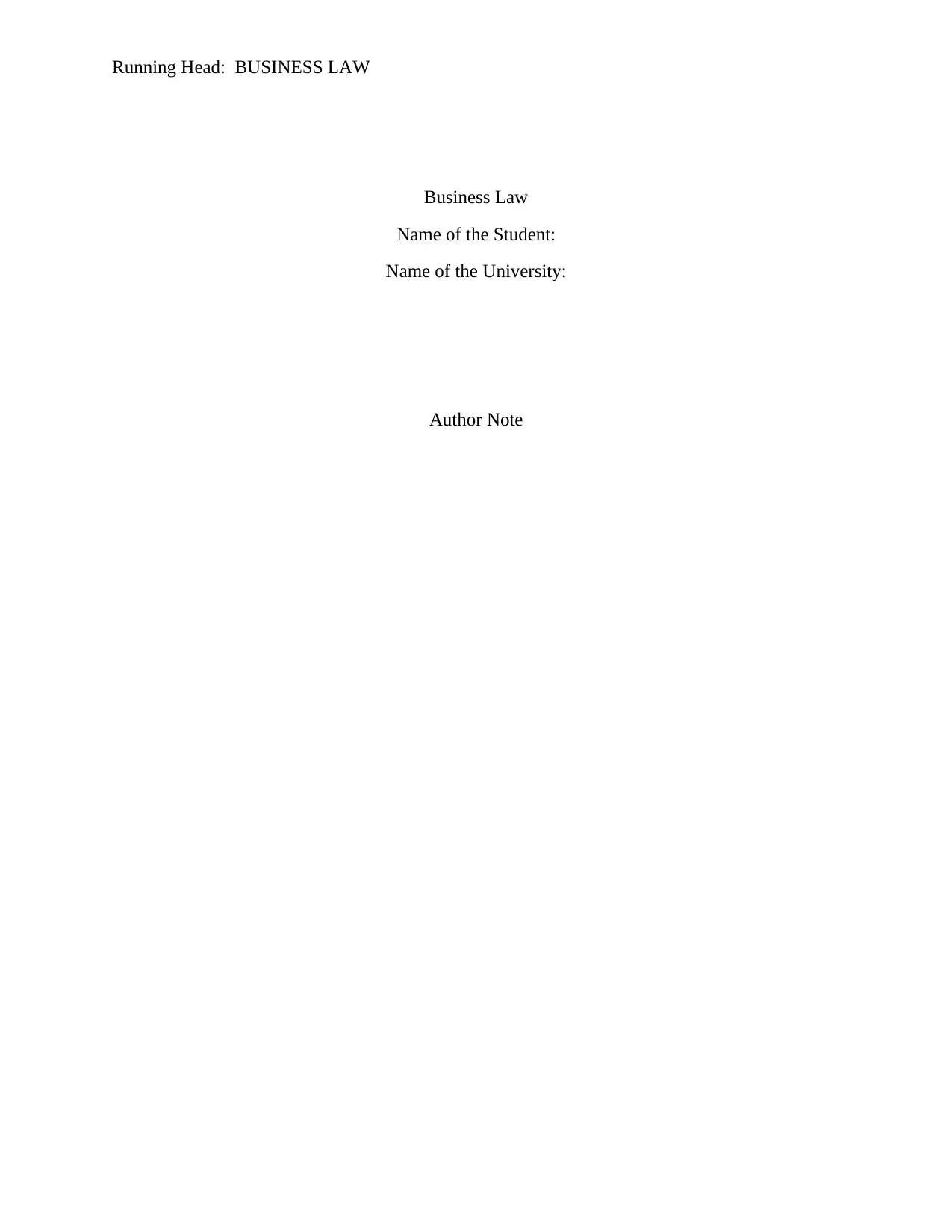
Running Head: BUSINESS LAW
Business Law
Name of the Student:
Name of the University:
Author Note
Business Law
Name of the Student:
Name of the University:
Author Note
Secure Best Marks with AI Grader
Need help grading? Try our AI Grader for instant feedback on your assignments.
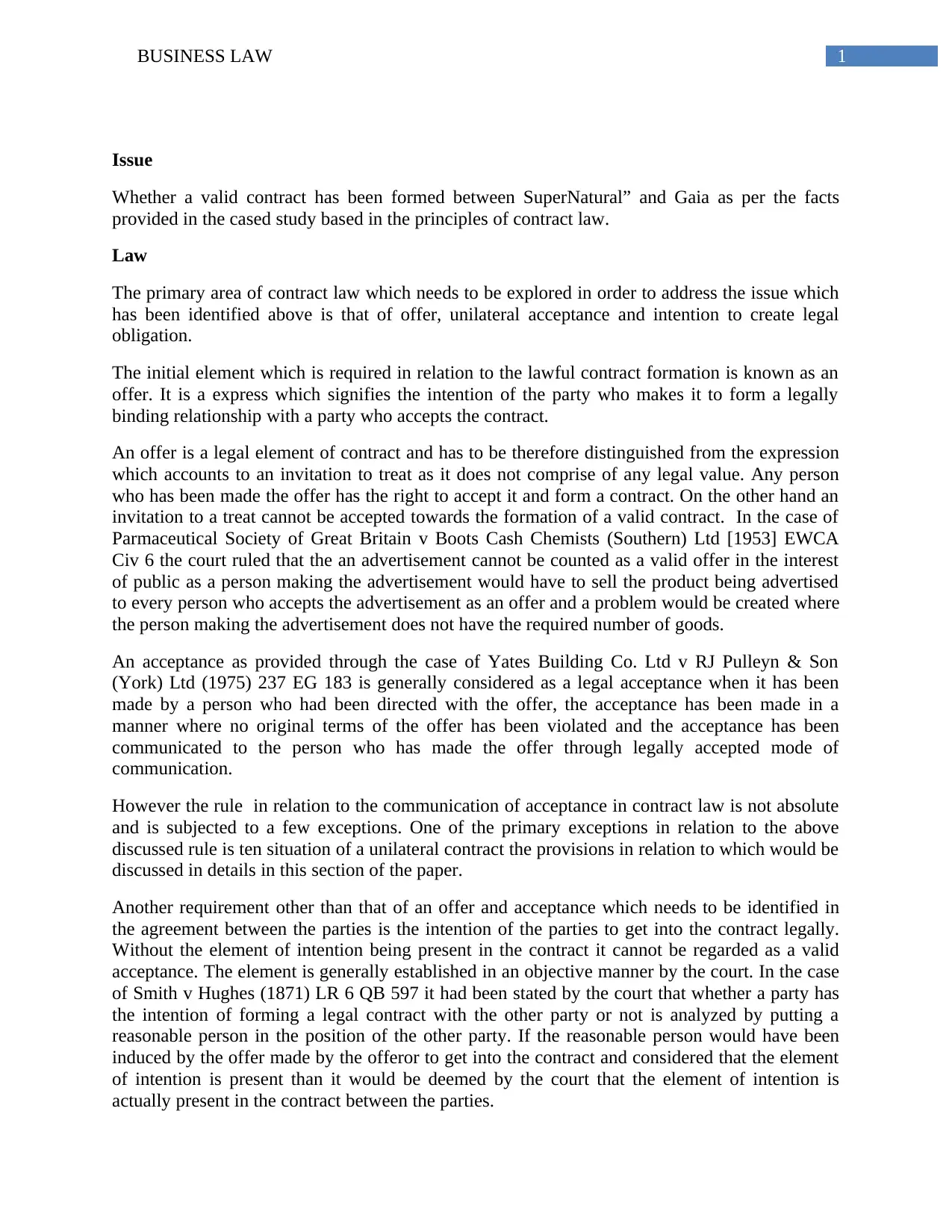
1BUSINESS LAW
Issue
Whether a valid contract has been formed between SuperNatural” and Gaia as per the facts
provided in the cased study based in the principles of contract law.
Law
The primary area of contract law which needs to be explored in order to address the issue which
has been identified above is that of offer, unilateral acceptance and intention to create legal
obligation.
The initial element which is required in relation to the lawful contract formation is known as an
offer. It is a express which signifies the intention of the party who makes it to form a legally
binding relationship with a party who accepts the contract.
An offer is a legal element of contract and has to be therefore distinguished from the expression
which accounts to an invitation to treat as it does not comprise of any legal value. Any person
who has been made the offer has the right to accept it and form a contract. On the other hand an
invitation to a treat cannot be accepted towards the formation of a valid contract. In the case of
Parmaceutical Society of Great Britain v Boots Cash Chemists (Southern) Ltd [1953] EWCA
Civ 6 the court ruled that the an advertisement cannot be counted as a valid offer in the interest
of public as a person making the advertisement would have to sell the product being advertised
to every person who accepts the advertisement as an offer and a problem would be created where
the person making the advertisement does not have the required number of goods.
An acceptance as provided through the case of Yates Building Co. Ltd v RJ Pulleyn & Son
(York) Ltd (1975) 237 EG 183 is generally considered as a legal acceptance when it has been
made by a person who had been directed with the offer, the acceptance has been made in a
manner where no original terms of the offer has been violated and the acceptance has been
communicated to the person who has made the offer through legally accepted mode of
communication.
However the rule in relation to the communication of acceptance in contract law is not absolute
and is subjected to a few exceptions. One of the primary exceptions in relation to the above
discussed rule is ten situation of a unilateral contract the provisions in relation to which would be
discussed in details in this section of the paper.
Another requirement other than that of an offer and acceptance which needs to be identified in
the agreement between the parties is the intention of the parties to get into the contract legally.
Without the element of intention being present in the contract it cannot be regarded as a valid
acceptance. The element is generally established in an objective manner by the court. In the case
of Smith v Hughes (1871) LR 6 QB 597 it had been stated by the court that whether a party has
the intention of forming a legal contract with the other party or not is analyzed by putting a
reasonable person in the position of the other party. If the reasonable person would have been
induced by the offer made by the offeror to get into the contract and considered that the element
of intention is present than it would be deemed by the court that the element of intention is
actually present in the contract between the parties.
Issue
Whether a valid contract has been formed between SuperNatural” and Gaia as per the facts
provided in the cased study based in the principles of contract law.
Law
The primary area of contract law which needs to be explored in order to address the issue which
has been identified above is that of offer, unilateral acceptance and intention to create legal
obligation.
The initial element which is required in relation to the lawful contract formation is known as an
offer. It is a express which signifies the intention of the party who makes it to form a legally
binding relationship with a party who accepts the contract.
An offer is a legal element of contract and has to be therefore distinguished from the expression
which accounts to an invitation to treat as it does not comprise of any legal value. Any person
who has been made the offer has the right to accept it and form a contract. On the other hand an
invitation to a treat cannot be accepted towards the formation of a valid contract. In the case of
Parmaceutical Society of Great Britain v Boots Cash Chemists (Southern) Ltd [1953] EWCA
Civ 6 the court ruled that the an advertisement cannot be counted as a valid offer in the interest
of public as a person making the advertisement would have to sell the product being advertised
to every person who accepts the advertisement as an offer and a problem would be created where
the person making the advertisement does not have the required number of goods.
An acceptance as provided through the case of Yates Building Co. Ltd v RJ Pulleyn & Son
(York) Ltd (1975) 237 EG 183 is generally considered as a legal acceptance when it has been
made by a person who had been directed with the offer, the acceptance has been made in a
manner where no original terms of the offer has been violated and the acceptance has been
communicated to the person who has made the offer through legally accepted mode of
communication.
However the rule in relation to the communication of acceptance in contract law is not absolute
and is subjected to a few exceptions. One of the primary exceptions in relation to the above
discussed rule is ten situation of a unilateral contract the provisions in relation to which would be
discussed in details in this section of the paper.
Another requirement other than that of an offer and acceptance which needs to be identified in
the agreement between the parties is the intention of the parties to get into the contract legally.
Without the element of intention being present in the contract it cannot be regarded as a valid
acceptance. The element is generally established in an objective manner by the court. In the case
of Smith v Hughes (1871) LR 6 QB 597 it had been stated by the court that whether a party has
the intention of forming a legal contract with the other party or not is analyzed by putting a
reasonable person in the position of the other party. If the reasonable person would have been
induced by the offer made by the offeror to get into the contract and considered that the element
of intention is present than it would be deemed by the court that the element of intention is
actually present in the contract between the parties.
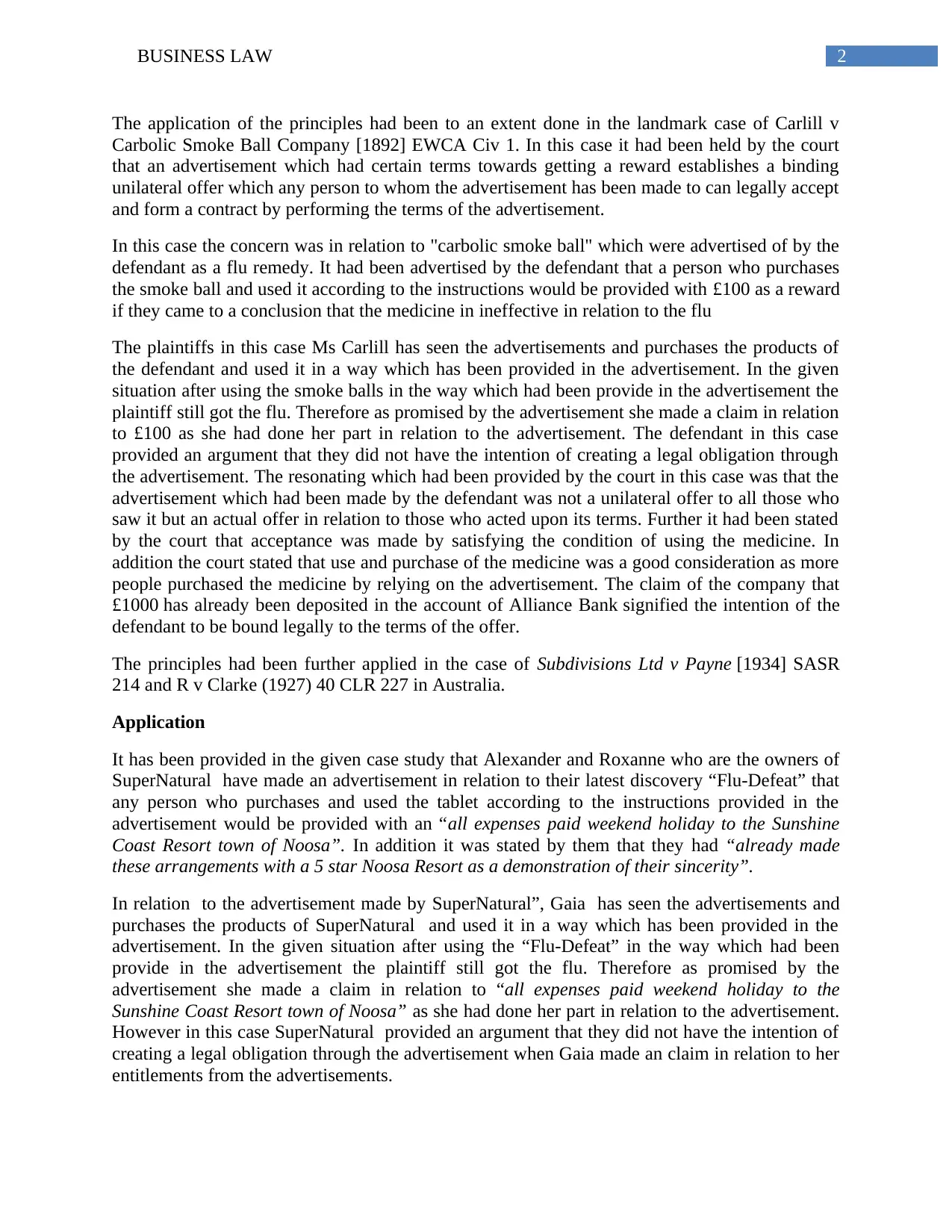
2BUSINESS LAW
The application of the principles had been to an extent done in the landmark case of Carlill v
Carbolic Smoke Ball Company [1892] EWCA Civ 1. In this case it had been held by the court
that an advertisement which had certain terms towards getting a reward establishes a binding
unilateral offer which any person to whom the advertisement has been made to can legally accept
and form a contract by performing the terms of the advertisement.
In this case the concern was in relation to "carbolic smoke ball" which were advertised of by the
defendant as a flu remedy. It had been advertised by the defendant that a person who purchases
the smoke ball and used it according to the instructions would be provided with £100 as a reward
if they came to a conclusion that the medicine in ineffective in relation to the flu
The plaintiffs in this case Ms Carlill has seen the advertisements and purchases the products of
the defendant and used it in a way which has been provided in the advertisement. In the given
situation after using the smoke balls in the way which had been provide in the advertisement the
plaintiff still got the flu. Therefore as promised by the advertisement she made a claim in relation
to £100 as she had done her part in relation to the advertisement. The defendant in this case
provided an argument that they did not have the intention of creating a legal obligation through
the advertisement. The resonating which had been provided by the court in this case was that the
advertisement which had been made by the defendant was not a unilateral offer to all those who
saw it but an actual offer in relation to those who acted upon its terms. Further it had been stated
by the court that acceptance was made by satisfying the condition of using the medicine. In
addition the court stated that use and purchase of the medicine was a good consideration as more
people purchased the medicine by relying on the advertisement. The claim of the company that
£1000 has already been deposited in the account of Alliance Bank signified the intention of the
defendant to be bound legally to the terms of the offer.
The principles had been further applied in the case of Subdivisions Ltd v Payne [1934] SASR
214 and R v Clarke (1927) 40 CLR 227 in Australia.
Application
It has been provided in the given case study that Alexander and Roxanne who are the owners of
SuperNatural have made an advertisement in relation to their latest discovery “Flu-Defeat” that
any person who purchases and used the tablet according to the instructions provided in the
advertisement would be provided with an “all expenses paid weekend holiday to the Sunshine
Coast Resort town of Noosa”. In addition it was stated by them that they had “already made
these arrangements with a 5 star Noosa Resort as a demonstration of their sincerity”.
In relation to the advertisement made by SuperNatural”, Gaia has seen the advertisements and
purchases the products of SuperNatural and used it in a way which has been provided in the
advertisement. In the given situation after using the “Flu-Defeat” in the way which had been
provide in the advertisement the plaintiff still got the flu. Therefore as promised by the
advertisement she made a claim in relation to “all expenses paid weekend holiday to the
Sunshine Coast Resort town of Noosa” as she had done her part in relation to the advertisement.
However in this case SuperNatural provided an argument that they did not have the intention of
creating a legal obligation through the advertisement when Gaia made an claim in relation to her
entitlements from the advertisements.
The application of the principles had been to an extent done in the landmark case of Carlill v
Carbolic Smoke Ball Company [1892] EWCA Civ 1. In this case it had been held by the court
that an advertisement which had certain terms towards getting a reward establishes a binding
unilateral offer which any person to whom the advertisement has been made to can legally accept
and form a contract by performing the terms of the advertisement.
In this case the concern was in relation to "carbolic smoke ball" which were advertised of by the
defendant as a flu remedy. It had been advertised by the defendant that a person who purchases
the smoke ball and used it according to the instructions would be provided with £100 as a reward
if they came to a conclusion that the medicine in ineffective in relation to the flu
The plaintiffs in this case Ms Carlill has seen the advertisements and purchases the products of
the defendant and used it in a way which has been provided in the advertisement. In the given
situation after using the smoke balls in the way which had been provide in the advertisement the
plaintiff still got the flu. Therefore as promised by the advertisement she made a claim in relation
to £100 as she had done her part in relation to the advertisement. The defendant in this case
provided an argument that they did not have the intention of creating a legal obligation through
the advertisement. The resonating which had been provided by the court in this case was that the
advertisement which had been made by the defendant was not a unilateral offer to all those who
saw it but an actual offer in relation to those who acted upon its terms. Further it had been stated
by the court that acceptance was made by satisfying the condition of using the medicine. In
addition the court stated that use and purchase of the medicine was a good consideration as more
people purchased the medicine by relying on the advertisement. The claim of the company that
£1000 has already been deposited in the account of Alliance Bank signified the intention of the
defendant to be bound legally to the terms of the offer.
The principles had been further applied in the case of Subdivisions Ltd v Payne [1934] SASR
214 and R v Clarke (1927) 40 CLR 227 in Australia.
Application
It has been provided in the given case study that Alexander and Roxanne who are the owners of
SuperNatural have made an advertisement in relation to their latest discovery “Flu-Defeat” that
any person who purchases and used the tablet according to the instructions provided in the
advertisement would be provided with an “all expenses paid weekend holiday to the Sunshine
Coast Resort town of Noosa”. In addition it was stated by them that they had “already made
these arrangements with a 5 star Noosa Resort as a demonstration of their sincerity”.
In relation to the advertisement made by SuperNatural”, Gaia has seen the advertisements and
purchases the products of SuperNatural and used it in a way which has been provided in the
advertisement. In the given situation after using the “Flu-Defeat” in the way which had been
provide in the advertisement the plaintiff still got the flu. Therefore as promised by the
advertisement she made a claim in relation to “all expenses paid weekend holiday to the
Sunshine Coast Resort town of Noosa” as she had done her part in relation to the advertisement.
However in this case SuperNatural provided an argument that they did not have the intention of
creating a legal obligation through the advertisement when Gaia made an claim in relation to her
entitlements from the advertisements.
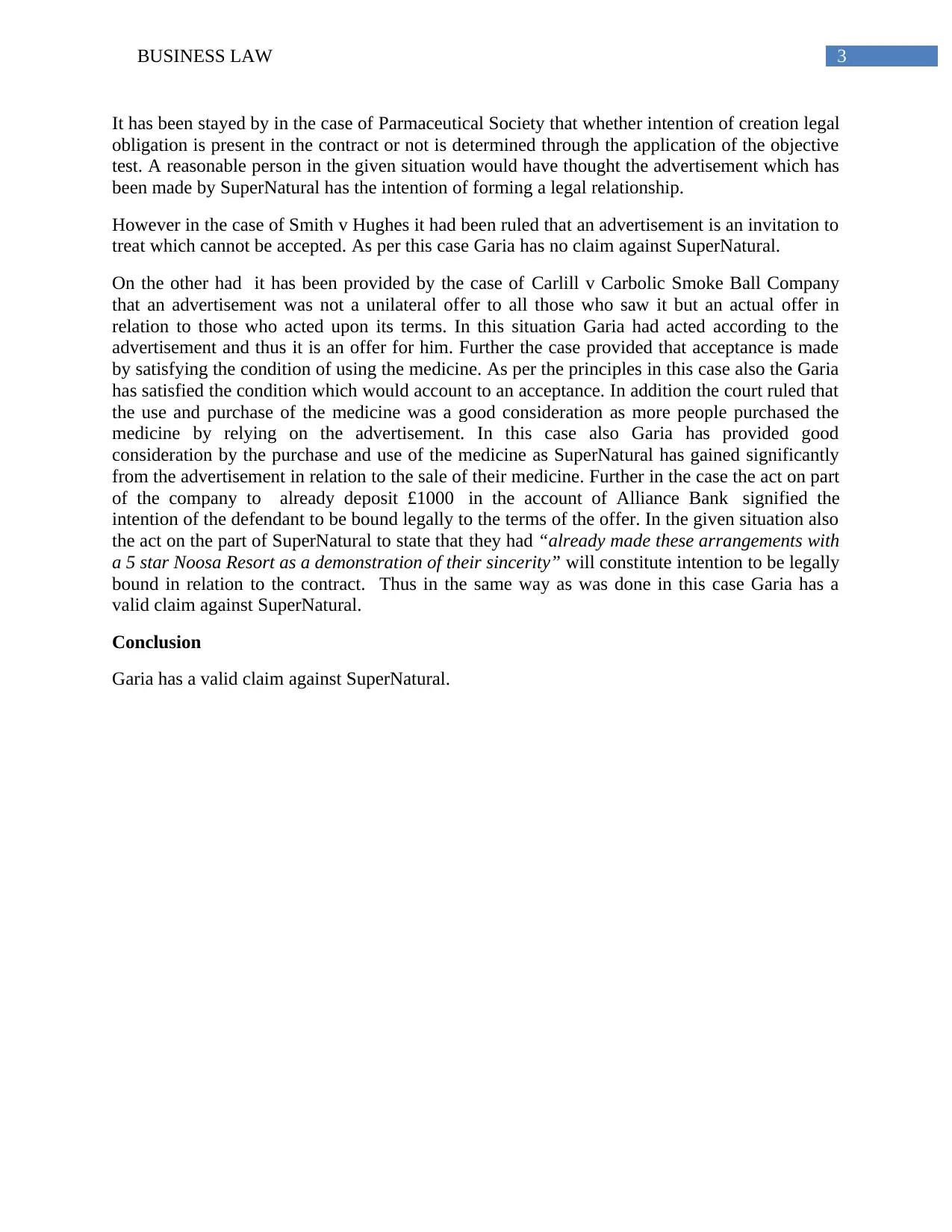
3BUSINESS LAW
It has been stayed by in the case of Parmaceutical Society that whether intention of creation legal
obligation is present in the contract or not is determined through the application of the objective
test. A reasonable person in the given situation would have thought the advertisement which has
been made by SuperNatural has the intention of forming a legal relationship.
However in the case of Smith v Hughes it had been ruled that an advertisement is an invitation to
treat which cannot be accepted. As per this case Garia has no claim against SuperNatural.
On the other had it has been provided by the case of Carlill v Carbolic Smoke Ball Company
that an advertisement was not a unilateral offer to all those who saw it but an actual offer in
relation to those who acted upon its terms. In this situation Garia had acted according to the
advertisement and thus it is an offer for him. Further the case provided that acceptance is made
by satisfying the condition of using the medicine. As per the principles in this case also the Garia
has satisfied the condition which would account to an acceptance. In addition the court ruled that
the use and purchase of the medicine was a good consideration as more people purchased the
medicine by relying on the advertisement. In this case also Garia has provided good
consideration by the purchase and use of the medicine as SuperNatural has gained significantly
from the advertisement in relation to the sale of their medicine. Further in the case the act on part
of the company to already deposit £1000 in the account of Alliance Bank signified the
intention of the defendant to be bound legally to the terms of the offer. In the given situation also
the act on the part of SuperNatural to state that they had “already made these arrangements with
a 5 star Noosa Resort as a demonstration of their sincerity” will constitute intention to be legally
bound in relation to the contract. Thus in the same way as was done in this case Garia has a
valid claim against SuperNatural.
Conclusion
Garia has a valid claim against SuperNatural.
It has been stayed by in the case of Parmaceutical Society that whether intention of creation legal
obligation is present in the contract or not is determined through the application of the objective
test. A reasonable person in the given situation would have thought the advertisement which has
been made by SuperNatural has the intention of forming a legal relationship.
However in the case of Smith v Hughes it had been ruled that an advertisement is an invitation to
treat which cannot be accepted. As per this case Garia has no claim against SuperNatural.
On the other had it has been provided by the case of Carlill v Carbolic Smoke Ball Company
that an advertisement was not a unilateral offer to all those who saw it but an actual offer in
relation to those who acted upon its terms. In this situation Garia had acted according to the
advertisement and thus it is an offer for him. Further the case provided that acceptance is made
by satisfying the condition of using the medicine. As per the principles in this case also the Garia
has satisfied the condition which would account to an acceptance. In addition the court ruled that
the use and purchase of the medicine was a good consideration as more people purchased the
medicine by relying on the advertisement. In this case also Garia has provided good
consideration by the purchase and use of the medicine as SuperNatural has gained significantly
from the advertisement in relation to the sale of their medicine. Further in the case the act on part
of the company to already deposit £1000 in the account of Alliance Bank signified the
intention of the defendant to be bound legally to the terms of the offer. In the given situation also
the act on the part of SuperNatural to state that they had “already made these arrangements with
a 5 star Noosa Resort as a demonstration of their sincerity” will constitute intention to be legally
bound in relation to the contract. Thus in the same way as was done in this case Garia has a
valid claim against SuperNatural.
Conclusion
Garia has a valid claim against SuperNatural.
Secure Best Marks with AI Grader
Need help grading? Try our AI Grader for instant feedback on your assignments.
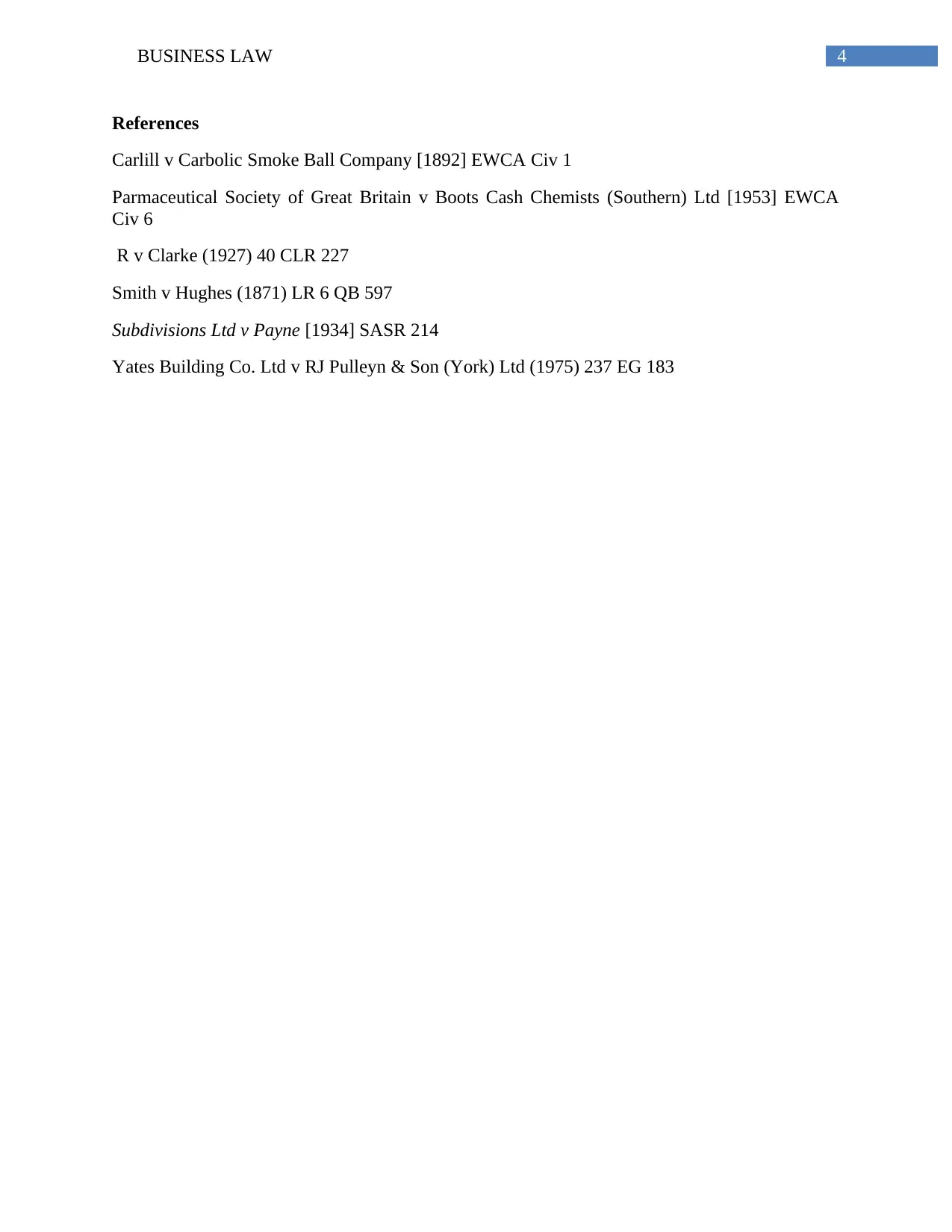
4BUSINESS LAW
References
Carlill v Carbolic Smoke Ball Company [1892] EWCA Civ 1
Parmaceutical Society of Great Britain v Boots Cash Chemists (Southern) Ltd [1953] EWCA
Civ 6
R v Clarke (1927) 40 CLR 227
Smith v Hughes (1871) LR 6 QB 597
Subdivisions Ltd v Payne [1934] SASR 214
Yates Building Co. Ltd v RJ Pulleyn & Son (York) Ltd (1975) 237 EG 183
References
Carlill v Carbolic Smoke Ball Company [1892] EWCA Civ 1
Parmaceutical Society of Great Britain v Boots Cash Chemists (Southern) Ltd [1953] EWCA
Civ 6
R v Clarke (1927) 40 CLR 227
Smith v Hughes (1871) LR 6 QB 597
Subdivisions Ltd v Payne [1934] SASR 214
Yates Building Co. Ltd v RJ Pulleyn & Son (York) Ltd (1975) 237 EG 183
1 out of 5
Related Documents
Your All-in-One AI-Powered Toolkit for Academic Success.
+13062052269
info@desklib.com
Available 24*7 on WhatsApp / Email
![[object Object]](/_next/static/media/star-bottom.7253800d.svg)
Unlock your academic potential
© 2024 | Zucol Services PVT LTD | All rights reserved.





